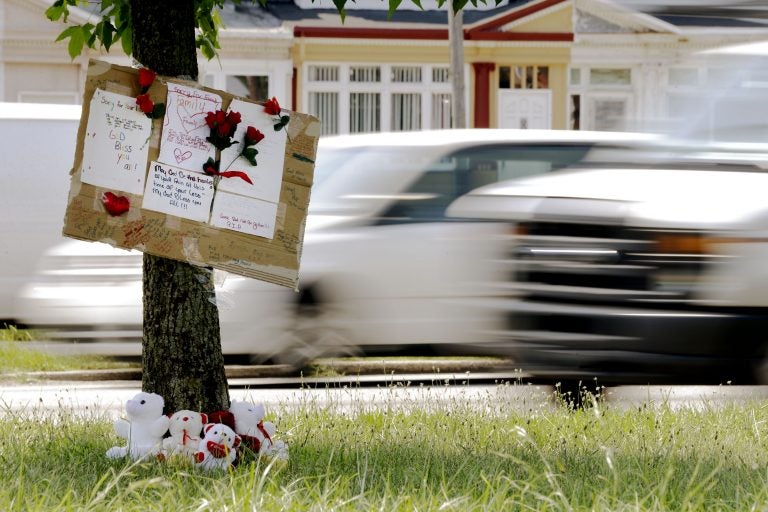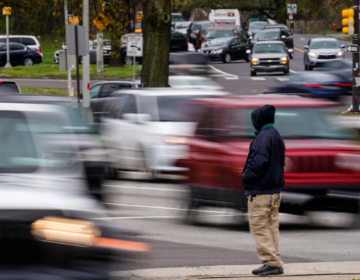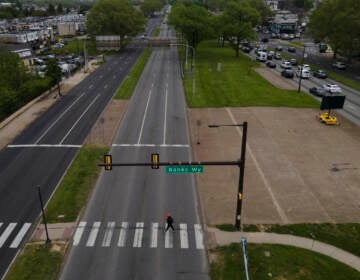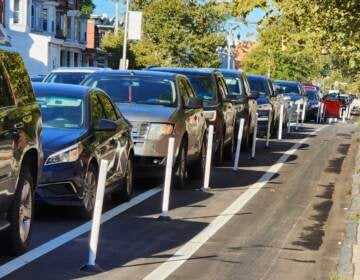Philadelphia’s deadliest road is inching toward speed cameras
Philadelphia drivers can expect to see speed enforcement cameras on Roosevelt Boulevard by the end of the year, city officials said Thursday.

A makeshift memorial is shown near the location where a mother and three young sons were struck and killed while trying to cross a busy highway after dark, Wednesday, July 17, 2013, in Philadelphia. (Matt Rourke/AP Photo)
This article originally appeared on PlanPhilly.
—
Philadelphia drivers can expect to see speed enforcement cameras on Roosevelt Boulevard by the end of the year, city officials said Thursday.
The 12-lane North Philadelphia road is the city’s most dangerous thoroughfare — 8 percent of fatal and severe crashes in the city between 2013 and 2017 occurred along its 12-mile stretch. The speed cameras, which advocates hope will slow vehicles and improve safety, have been in the works for years, with Gov. Tom Wolf signing legislation enabling their installation at the end of 2018. But before the enforcement devices can be installed in Philadelphia, municipal legislation must be passed. City Council took the first step towards installing the first nine cameras this week.
“Roosevelt Boulevard has long been known for being the most dangerous road in Philadelphia, and one of the most dangerous in Pennsylvania,” said Solomon Leach, director for research and communications for Councilwoman Cherelle Parker, who introduced the legislation. “We think these [speed] cameras are necessary for reducing traffic-related death.”
Between 2013 and 2017, 139 people were killed or badly injured on Roosevelt Boulevard. Roughly one third of those killed were pedestrians attempting to cross the 12-lane roadway. The individual stories are horrifying.
The cameras are meant to deter speeding by ticketing drivers going 11 miles or more over the speed limit on the boulevard.
The punishments would be staggered based on the car’s speed. Those going 11-to-20 miles over the limit would be hit with $100 fine. Cars going 21 to 30 miles over the limit would pay $125, and those going more than 31 miles would pay $150.
There would be a sixty-day grace after cameras are installed period before tickets would begin being issued. Warning signs would be posted along the boulevard.
Republican legislative leadership in Harrisburg long fought efforts to install cameras by refusing to bring enabling legislation to a vote. That changed last year when state Rep. John Taylor successfully secured passage of the legislation just before his retirement.
City Council supports the bill and it is expected to move forward easily. The Kenney administration also supports the cameras as one of a number of safety measures included in its Vision Zero initiative. Vision Zero calls for eliminating traffic deaths by 2030.
“If we get a chance to incorporate this new tool to reduce speeds, we will see fewer fatalities,” said Mike Carroll, deputy managing director for transportation and infrastructure systems. “We are very hopeful that will make a big difference, not just in the way folks use the Boulevard but in helping us focus more attention on other parts of the city.”
City Council saw several other streets-related bills move forward this week, including a measure to create a new class of unarmed safety enforcement officers who would police traffic and a bill that would make permanent the protected bike lanes on John F. Kennedy Boulevard and Market Street in the heart of Center City.
Mayor Kenney promised 30 miles of protected bike lanes over the course of his first term in office, but less than three miles of the safety infrastructure has been created. Unprotected bike lanes have lead to deaths and injuries, leading advocates to critique the city’s commitment to street safety and Vision Zero.
WHYY is your source for fact-based, in-depth journalism and information. As a nonprofit organization, we rely on financial support from readers like you. Please give today.







